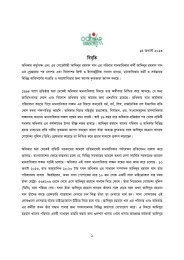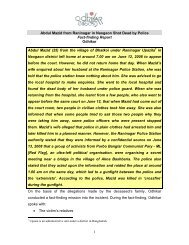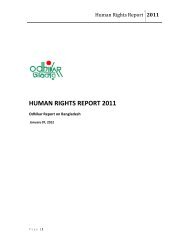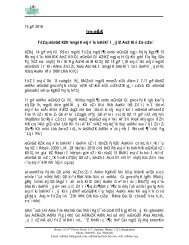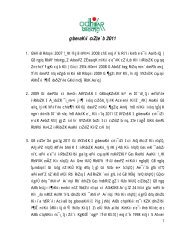Please - Odhikar
Please - Odhikar
Please - Odhikar
You also want an ePaper? Increase the reach of your titles
YUMPU automatically turns print PDFs into web optimized ePapers that Google loves.
the British police, also on the issue of racial bias. The issue then is not whether we will have<br />
institutions and set-ups that are entirely bias-free but whether we have the moral and ethical<br />
preparedness to accept that the malliase exists and thereafter set about attempts to cure it.<br />
For this to happen, institutions and those individuals that symbolise or man them need to purge<br />
themselves of the state of denial. Phsychologists say this is the surest form of defensiveness.<br />
Defensiveness suggests that the emotion hides a truth. So it is with communal bias in the Indian<br />
Police Force. First there needs to be strong and committed effort to get out of the constant state<br />
of denial. Simply because, since 1981 there are just too many concrete examples to show that<br />
communal bias not only exists but seriously affects, detrimentally, professional and neutral<br />
functioning, trampling on therefore the fundamental rights of a section of the citizentry to equal<br />
treatment by and protection from the law.<br />
The radical measures then needed include a re-vamping of the structure of the police. As<br />
important are prompt and punitive measures against officers and men guilty of crude and gross<br />
misdemeanors that include ethnically driven criminal acts including murder, loot and arson. In<br />
Hashimpura, Meerut, 1987, the Provincial Armed Constabulary of the UP police shot dead, in<br />
cold blood, 40 Muslim youth. Not a single man in uniform has been punished to date. In<br />
Bombay 1992-93, the then Joint Commissioner of Police, RD Tyagi shot dead nine innocent<br />
men believing them to be Kashmiri terrorists. Though chargesheeted, his trial for conviction is<br />
yet to begin. This author tapped police wireless messages during the second round of Bombay<br />
riots, in January 1993, the transcribed text of which reveal a deep and abiding anti-Minority<br />
hatred operating and affecting actions among a section of the Indian police. (see Annexure Two)<br />
In Gujarat, too, in all the scenes of recent massacre significant sections of the police were party<br />
to the crimes committed. It is unlikely that the struggle for justice against the criminals in<br />
uniform will chart any new path this time, without an outcry following a relentless national<br />
debate for drastic and radical police reform.<br />
Law on Mass Crimes<br />
Targeted violence directed at particular sections of society, be it an ethnic tribe, caste or a<br />
religious community, has over the past decades posed a serious challenge to traditional criminal<br />
jurisprudence. The very nature of these mass/collective crimes contain within them elements of<br />
pre-planning and complicity often compounded by the fact that both State and non-State actors<br />
are the perpetrators. Hence they require clearly defined and special legal and jurisprudential<br />
instruments.<br />
Internationally, democratic societies have responded to this disturbing trend that had hitherto<br />
allowed criminals in authority and uniform to go scot-free by enacting special laws pertaining to<br />
the prevention of, and punishment for genocide and crimes against humanity, as also adequate<br />
reparation for the victims of mass crimes.<br />
The enactment and adoption of the Rome Statute and the establishment of the International<br />
Criminal Court collectively by modern nation-states was meant to ensure that the punishment for<br />
genocidal acts or crimes against humanity is not prevented by countries protecting home-grown<br />
perpetrators and that internationally, their prosecution is possible. Interestingly, neither the USA<br />
182<br />
Report 2005




